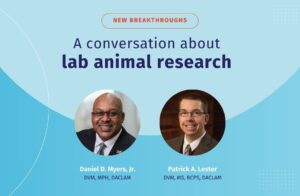For many, the new year starts off keenly focused on health and nutrition, but that focus can fade throughout the year. For Lindsey Bullen, DVM, DACVIM (Nutrition), veterinary nutrition is her focus every day! As one of the very few board-certified veterinary nutritionists in the field, Dr. Bullen brings passion and expertise to every case. She is constantly committed to bettering the health of her veterinary patients.
We teamed up with Lindsey for an exciting webinar (check out the recording if you didn’t have a chance to join us!) and we asked her to share more about this specialized field, the biggest misconceptions about her work as a nutritionist, the role of medication in her treatment plans, and the importance of bringing pet parents into the conversations about the best treatment for their furry friends.
Check out her thoughts below!
Veterinary nutrition is a very niche specialty. What path led you to it?
I actually wanted to be a general practitioner before I got into vet school because I didn’t know that there were specialties. I thought it was awesome because you get to dabble in everything as a general practitioner. However, once I figured out I could really focus my attention and specialize, I decided I wanted to be a surgeon. My dad is a human surgeon and my mom was a nurse for a while, so I was familiar with medicine. However, I realized that the work schedule of surgeons is less than desired, and as a woman who wanted to start a family, I didn’t think it would be the lifestyle for me. So, I went back to wanting to be a general practitioner and I took a basic nutrition course – and it was horribly boring! But then in my fourth year, I took an advanced nutrition course focused on tailoring each approach to the pet and just absolutely fell in love. I started seeing how every individual case was a puzzle. It is not a one-size-fits-all.
There are not very many board-certified veterinary nutritionists in the field, which I think is important to note. Anyone can go online and print out a certificate, but that doesn’t equal experience and expertise. Nutrition is a very opinionated and emotionally sensitive topic, but it’s absolutely a science.
Are veterinary nutritionists usually on-staff at a practice or is most of your work done by consultation?
Board-certified nutritionists can be in private practice, work in the food industry with pet food companies, or work in academia teaching and lecturing. For me, I dabble in every part of nutrition and wanted to do it all. I currently work for an amazing specialty practice in Washington, D.C. called Friendship Hospital for Animals, as an international lecturer. I travel all over the world to lecture, which is really my jam! I love to lecture. If I could just do that for a living, that is what I would do.
And that’s the biggest draw to nutrition for me. Every conversation is an opportunity for education. 99% of what I do is educating the client, the veterinarians or lecturing to a group of veterinary professionals. I love that I get to see individual pets and patients, but I also love that I get to help patients and pet parents on a larger scale by teaching other veterinarians how to do nutrition well. Unfortunately, there’s just not enough focus on nutrition in vet school.
Educational Webinars
We understand the value of continuing education for veterinary professionals.
Explore our upcoming and on-demand webinars for learning, growth, and understanding of regulatory standards, trends and insights in patient care, veterinary hospital best practices, and more.
What’s the importance of medication in your role as a nutritionist?
If my patients don’t eat, I can’t do my job. I will pull out all the tips and tricks I can that are not medication-related, not because medications are bad, but it’s just one more thing to ask a pet parent to do. There are absolutely times and places where medications are not only helpful as an adjunct but are the main part of the medical treatment, and nutrition is actually the adjunct.
A lot of people don’t know what board-certified veterinary nutritionists do and think we just treat with food, but we are experts in biochemistry and metabolism. We know what the individual cells of the body need, and we combine medication and nutrition to help the pet in the best way possible. Most of the patients that I see are on some form of medication. Again, I try not to use medications if I can get away with it, but when I’m communicating with my pet parents, having expectations from the beginning is very important because nobody likes veterinary medical surprises.
So, if I have a dog with GI disease, we can probably treat this with diet, but there’s always a possibility that we’re going to need immunosuppressants in the future. Or, if the pet feels nauseous, we’ll need anti-nausea / anti-emetic medications. Most diseases that are nutrition-responsive are absolutely medication-responsive as well.
What is the typical response from pet parents when you tell them there are going to be multiple aspects of a treatment plan?
I feel like by the time a pet parent gets to me they understand that their pet’s condition is probably a little more complicated than usual. Typically, I handle pets facing challenges where either a single ailment proves unresponsive to specific treatments, or they are grappling with multiple diseases. So, we have to bring everything together. And again, it’s all about expectations and communication. I tend to be a very empathetic person; empathy is probably my superpower (and also my downfall, haha). When I’m talking to pet parents I spend most of the appointment focusing on their pet, going through records together, and talking about all the different diseases that my detective work has brought to light., A lot of the pet parents haven’t heard of the things I share with them. We take time talking about how that disease affects their pet so that they understand why I’m recommending different things. If a pet has kidney disease, we will put them on a kidney diet. But as the doctor, I want to really explain to the pet parent each aspect of why their pet’s kidneys aren’t functioning properly so they understand, nutritionally and medically, how we are handling it.
It’s all about communication and making the pet parent feel like they’re part of the team and not just being told what to do. As the pet parent, they are the experts on the pet, so I want them to tell me what is going to work best for them and their pet. If I’m recommending that you medicate your cat four times a day and your cat causes a world war every time you bring out the pill bottle, we’re going to have to have a different conversation. That’s where that empathy factor comes in, being upfront that I’m going to ask you to do things and it’s okay if you can’t; you’re doing your best, and that’s okay. Most pet parents are willing to try the treatment once you let them know that there’s a choice and they’re not going to be judged.
I try to make it relatable. In veterinary school, you start by learning from the book. But what has made me a better doctor is having real-world experience, especially with my own pets. It makes it much easier to understand each case and makes the pet parents feel like they are not alone.
503B outsourcing facilities focus on quality and consistency. How does that influence your choices about what medications to prescribe and how to inform pet parents of those benefits?
The most important thing for me is that my clients have easy access to medications. I try to give them a choice, but I also try to educate them. The easier I can make it on my clients, the more likely they are going to be compliant. So, if it’s a standard medication that can be ordered from an online distributor such as a vet source or from a human pharmacy, I’m happy to do that if it’s easiest for them. When it comes to compounding, whether a dog is super small or needs an exact dose, I strongly recommend going with one from a 503B facility because you know for sure that the quality is consistent; it’s manufactured and basically human quality. I’ve seen cases where the quality is not there from other facilities. I would rather err on the side of caution, especially when it comes to certain medications like chemotherapeutics and blood pressure medications that can have negative effects if dosed incorrectly. The little extra cost is worth the peace of mind.
“Cost doesn’t always mean quality, but when I go with Epicur, it does!”
Do you find that you educate other veterinarians on the quality of 503B as much as pet parents?
Oh, all the time. Most people don’t know it exists. I think there is a gap in knowledge of 503Bs because it’s not something we are educated on in veterinary school. I took several lectures on pharmacology, and I’m not sure we even talked about compounding. Similar to the quality of nutrition, that never popped up. You learn, “This is a protein, this is a carbohydrate,” but not “here’s the disease and this is a combination of nutrients,” unless you really strive for the advanced courses. Once you get into practice you have to hold yourself accountable to learn new things, and you only have a finite amount of time for continuing education.
I wasn’t introduced to 503B until I started working with Epicur. It was good to know that some measures are in place so that facilities can’t just put out garbage, which could negatively impact my patients. Most people are trying to do the right thing for the right reasons. But cost definitely comes into play, and having quality control standards costs time and money. That’s why some will say, “It’s probably fine,” but I can sleep better at night knowing it is fine.
How did you first get introduced to Epicur?
I lectured at a virtual event and entered my name in Epicur’s virtual booth to win a prize. I won the AirPods! Sam Newton asked where to ship them and we found out that we both lived near Raleigh, North Carolina. She ended up shipping them to me, but since she was in the area, she came to the veterinary practice I worked for to have lunch and teach us about Epicur and 503Bs.
Sam and I really hit it off; she is just a phenomenal individual, and the more I learned about her as a person the more I saw how genuinely kind and compassionate she is, and I wanted to be her friend. We would meet again at other events and she would drop additional tidbits about Epicur, but never in a salesy way.
One time, she asked me what my passion was and I told her that I liked to talk. She shared that Epicur works with veterinary professionals for webinars and continuing education and asked if I wanted to collaborate. I was excited to be able to teach a webinar on Nutrition for them at the beginning of February.
On-Demand
Nutrition Webinar: Battling Inappetence
In this nutrition webinar presented by Dr. Bullen, you’ll learn:
- Definitions of appetite-associated words
- Pros and cons (where applicable) of appetite stimulants
- Communication strategies to implement with clients

One of the reasons why I continue to work with Epicur is because they are good people who strive for excellence, and it fits with my own ethical opinions. Many people are comfortable with the status quo and that is not my style, and it’s very much not Epicur’s style either. I like to surround myself with like-minded individuals trying to elevate veterinary care and medicine and continue reaching for the stars. We might not ever reach perfection, but as long as we’re trying to achieve perfection we will continue to make advancements for the betterment of the pet and the pet parents. And that is why I do what I do, and that’s why I love working with Epicur, because they do the same.
Telemedicine has had a positive impact on veterinary medicine, increasing efficiency and improving client relationships. How has telemedicine benefited your work?
As a nutritionist, there are only a handful of us in private practice and most of us are booked out for months. If we were not allowed to do telemedicine there would be no way to help the general pet population. I live in North Carolina but work for a hospital in D.C., and I have clients all over the world. Since there are only around 10 practicing certified nutritionists in the United States (most of the others are either in academia or work in the pet food industry), if we were only allowed to see clients within our limited geographic area this would leave so many pets across the globe without access to our services.
Personally, I don’t think we can view telemedicine as black or white. This perspective ignores the fact that there are numerous pets and pet parents doing their own thing, which is often more harmful than a vet professional not physically putting hands on the pet. I believe COVID, despite its many challenges, taught us that telemedicine can be done well in certain instances. Of course, it can also be done poorly, but the same applies to veterinary medicine in general. Just physically putting hands on an animal doesn’t necessarily make it better.
For me, the benefit of having a flexible life is something crucial for a burnt-out veterinarian. Balancing a career with a family is tough; I have a seven-year-old, a four-year-old, and a husband and I want to physically and mentally be there for them all. Being a vet is challenging, we have one of the highest suicide rates and mental health issues among professionals. While there’s more awareness now, there’s still not enough support. This is one reason why I prioritize life flexibility and my own mental well-being.
Need support? Many veterinary professionals are in crisis. Not One More Vet (NOMV) provides the necessary support to all members of veterinary teams and students who are struggling. Because you are good enough, and you are never alone.
Telemedicine has been great for me and other nutritionists, offering the flexibility to focus on what truly matters. In my view, telemedicine is beneficial to everyone involved.
Thanks for sharing these insights, Lindsey!
More Insights and Veterinary Trends

Innovating Pain Management in Veterinary Research Medicine
Epicur Pharma recently partnered with two passionate veterinary research professionals, Dr. Daniel D. Myers Jr., DVM, MPH, DACLAM, and Dr. Patrick A. Lester, DVM, MS, BCPS, DACLAM, to bring a groundbreaking analgesic solution to market for research animals: Buprenorphine Extended Release. We sat down with them to reflect on their path to partnering with us and their hopes for the future of veterinary medicine.

Controlled Substances 101: How & Why You Must Comply! Parts 1 and 2
December 8 | 7 p.m. ET RACE-Approved CE Credit Hours: 2Free to attend Attendees will learn how to improve security, prevent theft per DEA regulations and proactively prepare for a DEA audit and best practice time saving suggestions from a previous veterinary practice owner, consultant & public speaker/educator, who has worked with Veterinarians cited by the DEA. Save My Seat

Introduction to Cancer Genomics and Precision Medicine for Dogs
April 14 | 8 p.m. ET RACE-Approved CE Credit Hours: 1Free to attend In this presentation, you will learn about cancer genomic testing for the veterinary patient and how tumor genetic biomarkers can guide and enhance diagnosis and treatment protocols. In addition, you will learn how genomics testing can offer better prognostic projections based on genetic mutations present in a particular tumor. Watch It Now


